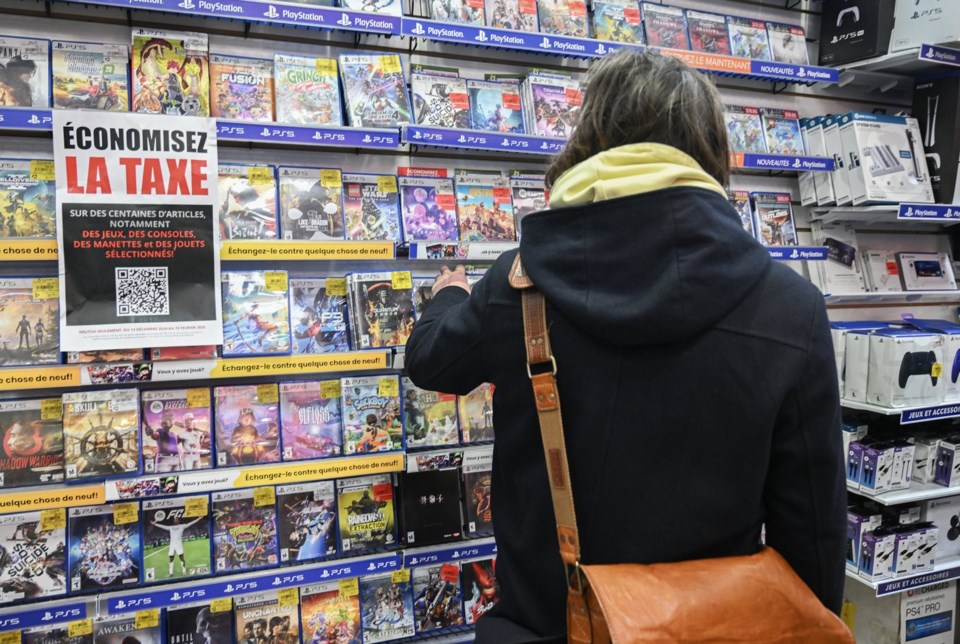Almost a week into the GST holiday, retailers and restaurant owners appear on track for a sales boost despite some of the struggles they faced implementing the temporary break.
BMV Books owner Patrick Hempelmann says he's seen an uptick in sales since the tax break began, particularly on higher-priced items.
"The first two days, I think we were definitely busier than we otherwise would have been," he said.
For two months, a slew of items including children’s toys, snacks, wine and restaurant food are GST- or HST-free, depending on the province.
The vice-president of federal government relations for the Retail Council of Canada, Matt Poirier, says Boxing Day in particular is expected to get a boost.
However, he says businesses, including ones with older payment systems, have faced hurdles trying to implement the tax break on short notice and even figuring out which items qualify.
The complications — and the boost in customers — depend on the store, he said.
For example, toy stores reported large declines in sales ahead of the tax break kicking in, said Poirier, as customers waited a few extra days to buy Christmas gifts.
"For a lot of retailers, it's shifting the buying patterns, but I think overall they're seeing a net increase," he said.
An RBC Economics report on Thursday showed retail spending slowed in November, with holiday spending slightly below 2023 levels over the Black Friday weekend. Spending on hobbies, toys and games scaled back notably after Nov. 21, wrote RBC economist Carrie Freestone — the day the tax break was announced.
"Typically, spending on popular children’s gifts builds as the holiday season approaches," wrote Freestone.
But even with November's decline, Canada is likely on track for a slight uptick in per-person retail spending in the fourth quarter for the first time since mid-2022, she wrote.
For Hempelmann, the transition has been relatively painless: most of the items in his store qualify for the tax break.
"It wasn't that complicated," he said.
However, some items — like vinyl records and journals — do not qualify. Others have caused confusion. For example, Hempelmann said he found out that graphic novels qualify for the break but the thin, old-fashioned comic books known as "floppy comics" do not.
Restaurants Canada president and CEO Kelly Higginson says it’s been a little easier for restaurant owners, as everything they generally sell excluding hard liquor qualifies for the break.
Beer is tax exempt, as are premixed drinks below seven per cent alcohol by volume. Wine, cider and sake below 22.9 per cent are also exempt. But liquor is not, meaning a cocktail or mixed drink made at a bar would not qualify for the tax relief.
An LCBO spokesperson said the alcohol retailer is also seeing an uptick in sales compared with last year.
While the revenue boost over the holiday is welcome for restaurants and bars, Higginson says it’s the expected uptick in spending during the slow January and February period that will really make the difference.
"I think this is going to really be impactful during that January, February period where people will be able to spend a little bit more," she said.
"They'll have a little bit of extra cash in their pocket from all the other savings as well."
"There has been a fairly significant spike since this started," said Paul Bognar, president and chief operating officer of Service Inspired Restaurants, which operates numerous restaurants, including Jack Astor’s and Scaddabush.
"You do hear it from guests, saying, 'Yeah, you know, it's a nice break. It allowed us to go out, we're not feeling guilty about it.'"
He said the change was relatively seamless, as most items at restaurants are exempt, and the payments system the company uses, Moneris, "got out ahead of it."
However, the fact that mixed drinks like cocktails are not exempt did make it a little more complicated, said Bognar.
He said he's optimistic about the slow period after the holidays, too.
"The dreaded January, February is just the hardest time for the restaurant industry, but I do think we're going to see a little bit of an uptick," Bognar said.
There was some chatter about how the change could affect tips for servers and kitchen staff, Restaurants Canada's Higginson said, noting some guests tip as a percentage of the whole bill, including tax. But she said in those cases, the higher traffic over the holiday and the slow period should still lead to a "net positive."
Bognar said his restaurants' payments system calculates tips pre-tax, which helped make the transition even easier.
"That was just something we didn't have to worry about."
This report by The Canadian Press was first published Dec. 20, 2024.
Rosa Saba, The Canadian Press




